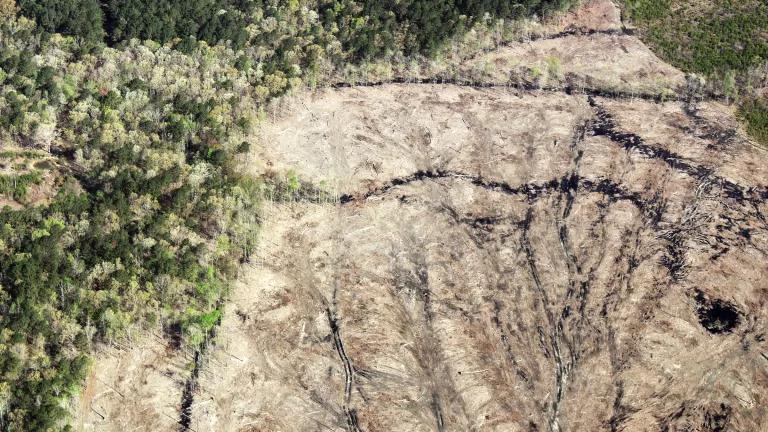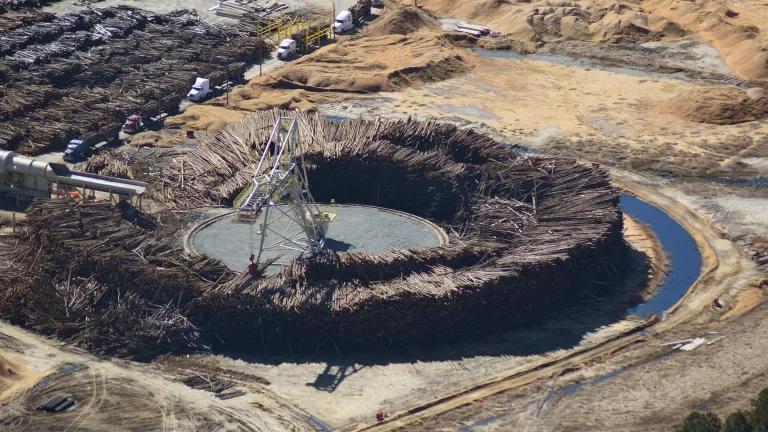The World Is Mobilizing Against Big Biomass
This week, communities around the world will highlight that the production and export of forest-based biomass threatens communities and the climate.

Clearcut for biomass production
Dogwood Alliance
On Thursday, October 19th, individuals and organizations around the world will take part in an international day of action against “Big Biomass.” In demonstrations, briefings, and other actions spanning six continents, participants will stress that burning forest-based wood pellets for large-scale energy production harms communities and imperils efforts to fight climate change. Communities will urge governments in many countries to prevent carbon-storing forests from being turned into wood chips, and to implement global safeguards that prevent forest-based biomass from being treated as a climate solution at moments like this year’s Climate COP.
Some of the key geographies where NRDC is working with partners to fight the threats of biomass include the United States, Canada, and the United Kingdom. The U.S. and Canada have become major players in the forest biomass economy, ranking first and third respectively in global exports of wood pellets for commercial-scale energy production. The UK is Europe’s largest importer of wood pellets.
Contrary to hard science, industry maintains that wood pellets from logged forests are a sustainable source of energy. Experts have shown that clearcutting forests to be exported and burned for biomass is a false climate solution, that it destroys carbon-storing trees and soils, and that these activities will release more CO2 than burning fossil fuels on the timescale that scientists say is critical to reduce emissions. With global temperatures smashing records in 2023, emissions need to fall now to prevent passing dangerous climate tipping points. In countries including Canada and the UK, forest-based biomass also relies heavily on government subsidies that otherwise could expand truly clean energy at a rapid scale or support the protection of natural carbon stores.
Yet some countries are buying this false promise. The UK, like many other European countries, is hinging its energy future on importing enormous volumes of forest-based wood pellets, claiming that this will help them achieve net zero emissions. Canada, in turn, exports 90 percent of the wood pellets it produces, feeding growing international demand from Europe and Asia. Large volumes of pellets used for biomass come from Canadian primary forests, or never-industrially-disturbed, irreplaceable carbon stores that scientists say need to be protected. Canada’s failure to transparently measure and report on the true emissions associated with widespread industrial logging has allowed it to downplay the cost of clearcutting carbon-rich forests, fostering the false narrative that this logging—and biomass production—is carbon-neutral.
In the U.S.—as in Canada—while burning wood pellets to generate electricity is still a relatively small portion of the country’s energy portfolio, the logging of trees and manufacturing of wood pellets that are exported overseas is expanding significantly. The industry is not only contributing to the climate crisis, but is an environmental justice threat. Pellet mills in the U.S. disproportionately harm vulnerable communities that are already suffering from environmental injustices. They emit dangerous air pollutants, including soot, nitrogen oxides, carbon monoxide, and volatile organic compounds, and have repeatedly exceeded air pollution limits. Communities are reporting significant health impacts. In the southeastern U.S., pellet mills are more than 50% more likely to be located in high poverty communities of color.
As one example of the industry’s expansion in the U.S., the wood pellet industry is increasing its geographical reach into California to better serve markets in Japan and South Korea. The industry track record of environmental injustice threatens to continue as the proposed port location of Stockton is in the 99th percentile statewide for pollution burdens. This community—ranked as within the top five of disadvantaged communities in California—is demanding their commissioners block the project proposed by Golden State Natural Resources.
On October 19, communities around the world will come together united against forest-based biomass, stressing its risks to communities and the climate. The question is: will governments listen?





